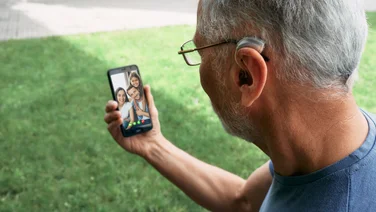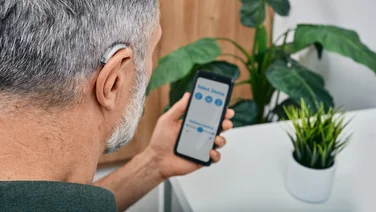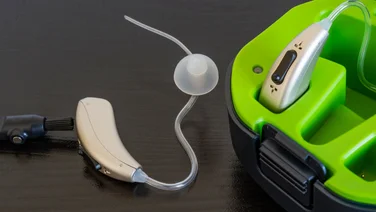To help us provide you with free impartial advice, we may earn a commission if you buy through links on our site. Learn more

Everyone knows that hearing aid batteries are a big part of being a hearing aid user. You need to recharge them every day or replace them every few days or weeks. How often you need to do this depends on numerous factors, including the type of hearing aid you have, how much you use it and the size of the battery it takes.
How long your hearing aid batteries last can also vary dramatically according to the high-power functions you use. These functions include high levels of audio enhancement and digital features such as Bluetooth and mobile streaming.
Our in-depth article on hearing aid batteries covers the different types of disposable and rechargeable batteries you need to know about when investing in hearing aids. In this article, we’ll go into more detail about how long different hearing aid batteries last and how to make yours last as long as possible.
Get a free hearing aid quote today
In need of a new set of hearing aids? Take our quick survey below and we’ll match you with a hearing aid provider that suits you.
How long do disposable hearing aid batteries last?
Disposable hearing aid batteries currently account for around half of all hearing aid batteries and last up to about three weeks for low-power users. High-power users, however, may need to replace them as frequently as every two or three days. That’s still longer than a single rechargeable hearing aid battery lasts before it needs charging, which tends to be every night.

Different sizes of disposable hearing aid batteries have different average lifespans, with the smaller batteries typically running out before the larger ones:
- Size 10 (smallest): three to seven days
- Size 312: three to ten days
- Size 13: six to 14 days
- Size 675 (largest): nine to 22 days
Having said that, bigger batteries fit larger hearing aids, which also tend to be those packed with high-power functions that drain batteries faster. So even though smaller batteries have a lower typical lifespan when all other things are equal, they fit into hearing aids that don’t tend to drain them as fast.
If you want to keep your hearing aid running costs to a minimum, ask your audiologist for a hearing aid that takes size 675 batteries (which last longest) or size 13 (usually the cheapest) but without too many high-drain functions. This will be the case with many behind-the-ear (BTE) and in-the-ear (ITE) hearing aid models at the lower end of the price bracket.
READ NEXT: How much do hearing aids cost?
How long do rechargeable hearing aid batteries last?
Rechargeable hearing aid batteries last between about 12 and 24 hours before they need charging. This is true both for batteries built into rechargeable hearing aids, which you charge up by placing them in their charger, and also for the rechargeable batteries you can buy for conventional hearing aids.
These replaceable rechargeable batteries, such as the PowerOne ACCU Plus (£22 for 2x size 13), are a relatively new innovation and only come in sizes 13, 13A and the slightly smaller 312. They cost significantly more up front than disposable hearing aid batteries, and you’ll also need to buy a charger (the PowerOne Pocket Charger costs £93). Still, their lifespan of up to five years means you’ll no longer have to purchase disposables every few weeks.
READ NEXT: Our guide to rechargeable hearing aids
How can I make my hearing aid batteries last longer?
The only guaranteed way to make your hearing aid battery last longer without switching it off is to use low-power sound enhancement and functions. However, this may not be an option for you. If you want to use your hearing aid to its maximum potential and get the most out of its batteries, here are a few tips:
- Turn your hearing aid off when you’re not wearing it, and turn the volume down when you’re not using it.
- Leave the battery compartment door open overnight. This helps keep battery power from being wasted and allows moisture to evaporate after building up during the day.
- Store your hearing aid and batteries in a dry place at room temperature. Heat exposure and humid environments such as a bathroom will shorten battery life, and keeping batteries and devices in the fridge can cause condensation.

- Avoid keeping your hearing aid batteries loose in your bag or pocket; if they come into contact with other metal objects, such as keys and coins, they can short-circuit and stop working. It’s a good idea to keep some spares with you, but keep them in their packaging.
- If you’re bothered by the short lifespan of your hearing aid batteries, talk to your audiologist. They can help you choose the right type of batteries for your hearing aids and give you tips to extend their lifespan.
READ NEXT: Bone anchored hearing aids
How will I know when to change my hearing aid battery?
You can usually tell when a hearing aid battery is low because the sound starts to distort. The battery can then stop working quite quickly, so it’s always worth having some spares to avoid losing power in the middle of the day or when you need it.
READ NEXT: Invisible hearing aids
How long is a hearing aid battery’s shelf life?
You can keep sealed, unused hearing aid batteries for around three years before they start to lose power. Some manufacturers make batteries with a longer shelf life. For example, Energizer Hearing Aid Batteries (£6.99, size 13, pack of eight) hold power for up to four years in storage and boast anti-leak technology to help you store them safely.
When storing hearing aid batteries to use later, make sure you keep their stickers on. All disposable hearing aid batteries are zinc-air batteries covered with a colour-coded label that prevents the zinc from coming into contact with the air. Remove it to activate the battery, wait one minute and it will be ready to use.






